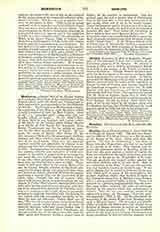

Memberton, principal chief of the Micmac Indians of Nova Scotia at the time of the establishment of the French colony under De Monts and Poutrincourt in 1605, and noted in mission annals as the first Christian in the tribe. The French form Memberton is a dialectic corruption of the Micmac name Maopeltu, which is itself a contracted form for Maoi-Napeltu, “chief of all”, i.e. “principal chief”, from maoi (all) and napeltu (chief, or leader). On St. John’s Day, June 24, 1610, he was baptized with twenty others of his family by the secular priest Father Messire Jesse Fleche at Port Royal, now Annapolis, Nova Scotia, Poutrincourt and his son acting as sponsors for the King and Dauphin of France. He was given the name of Henry, after Henry IV, his wife was named Marie after the queen regent, while his children and other relatives were called after members of the royal family. Then very old, although vigorous mentally and physically, he claimed to remember the first visit of Cartier to the Saint Lawrence in 1534. For many years the acknowledged chief and war captain, medicine man and priest of tribal ceremonies, in the midst of paganism he led a temperate and moral life, even before baptism limiting himself to one wife, where polygamy was the rule among the great men, one chief having as many as eight. On account of their good offices in the serious illness of his son, he became strongly attached to the Jesuit missionaries Biard and Masse, who arrived in June, 1611, and proved an earnest, practical Christian, frequently expressing a fervent hope for the conversion of his whole tribe. Towards the end of August, 1611, seized with his last illness, he was brought at his own request to Father Biard’s house, where he died a week later, after having received every attention, and, having given consent to be buried in the Christian cemetery as an example to his people, whom he repeatedly exhorted to maintain friendship with the French, he was buried with full ecclesiastical solemnity as befitted his rank and character. Father Biard says of him, “This was the greatest, most renowned, and most formidable savage within the memory of man; of splendid physique, taller and longer-limbed than is usual among them; bearded like a Frenchman, although scarcely any of the others have hair upon the chin; grave and reserved; feeling a proper sense of dignity for his position as commander. God impressed upon his soul a greater idea of Christianity than he has been able to form from hearing about it, and he has often said to me in his savage tongue, `Learn our language quickly, for as soon as thou knowest it and hast taught me well I wish to become a preacher like thee’. Even before his conversion he never cared to have more than one living wife.” In accordance with a universal Indian dislike to name the dead, his people referred to him after his death simply as the “Great Chief”. At the Micmac mission town of Sainte-Anne de Ristigouche, Quebec, a monument was unveiled on the third centenary of his baptism to commemorate the beginning of the Micmac mission.
FATHER PACIFIQUE

